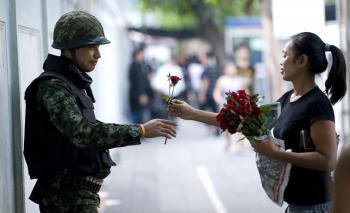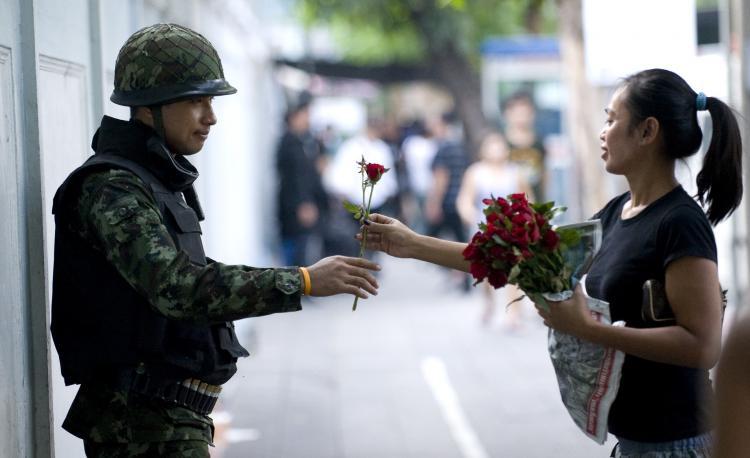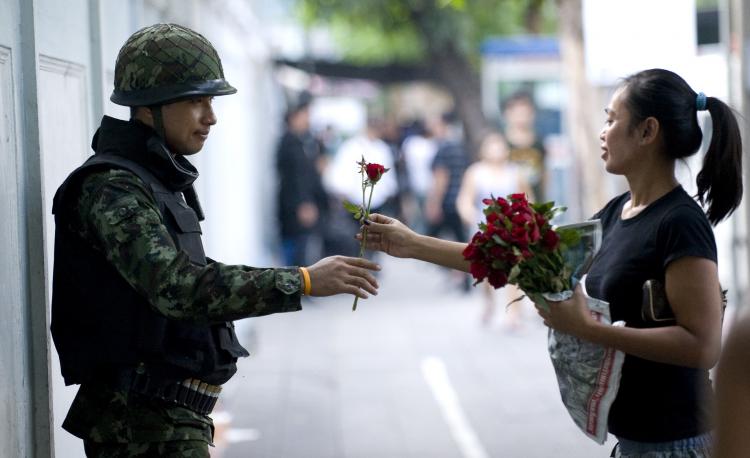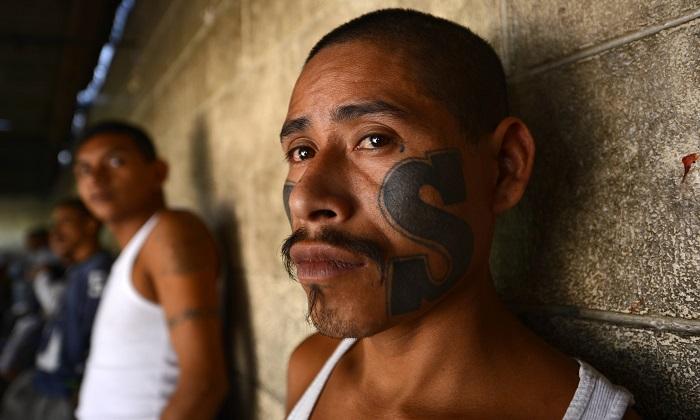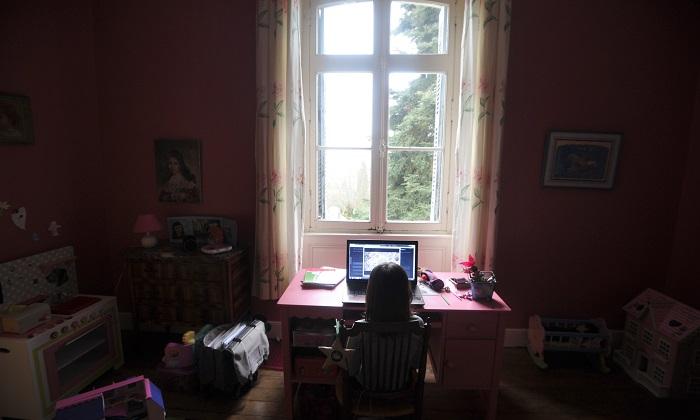BANGKOK, Thailand—As Thailand moves into its eighth week of political upheaval, an international think tank warns the country could be heading into an undeclared civil war—at the same time, the nation’s prime minister has offered a roadmap to reconciliation to help resolve the crisis.
Via a nationally televised address on Monday night, Prime Minister Abhisit Vejjajiva put forward a mid-November date to hold elections if the anti-government red shirt protesters accepted his five-point reconciliation plan and that the country was stabilized.
His five-point roadmap includes respect for the monarchy, reforms to address social and economic injustice, a free media, investigations into the more serious events of the past eight weeks, and examining the need for constitutional reform.
“I’m convinced that it will not take long to achieve national reconciliation and when we achieve national reconciliation the government is ready to hold elections on November 14,” Prime Minister Abhisit said, reported the BBC. “I think this is the best solution at the current time.”
Red shirt leaders are to discuss the prime minister’s proposal and are expecting to give an answer by Tuesday.
The prime minister’s roadmap to reconciliation comes during increasing tensions in Bangkok, which has seen 27 people killed in associated violence, mainly in vicious street battles between security forces and the anti-government red shirt protesters on April 10.
Just days prior to Prime Minister Abhisit’s announcement, an international think tank, said that the situation in Thailand was moving toward a worst-case scenario.
“The Thai political system has broken down and seems incapable of pulling the country back from the brink of widespread conflict,” the International Crisis Group (ICG) said in a statement.
“The standoff in the streets of Bangkok between the government and red shirt protesters is worsening and could deteriorate into an undeclared civil war. The country’s polarization demands immediate action in the form of assistance from neutral figures from outside,” the group said.
“The fault lines are widening between the establishment (an amalgam of elderly courtiers, powerful generals and many middle class supporters) and the protesters, many of whom support former Prime Minister Thaksin Shinawatra,” ICG said.
“Thais are deeply disillusioned by an urban elite that has, for decades, denied them the fruits of development and then ousted a government elected mostly by the rural poor.”
The red shirts, formally known as the United Front for Democracy against Dictatorship, have occupied a Bangkok shopping district since early April, turning it into a massive fortified camping ground, which has closed many of the businesses in the area. Before then, they had been holding mass rallies since mid-March and had another base in Bangkok’s historic quarter.
The red shirts, who are mostly rural or urban poor, have demanded that the prime minister step aside and make way for fresh elections.
New York-based Human Rights Watch (HRW) have also released a report detailing what it described as an “increasingly deadly conflict” and called for restraint from all involved parties.
“Thailand is spiraling further into political violence as protesters, counter-protesters, and security forces respond tit-for-tat against attacks and provocations,” said Brad Adams, Asia director for HRW. “All sides need to rein in their supporters, order the attacks to stop, and negotiate a political solution before the situation escalates.”
Via a nationally televised address on Monday night, Prime Minister Abhisit Vejjajiva put forward a mid-November date to hold elections if the anti-government red shirt protesters accepted his five-point reconciliation plan and that the country was stabilized.
His five-point roadmap includes respect for the monarchy, reforms to address social and economic injustice, a free media, investigations into the more serious events of the past eight weeks, and examining the need for constitutional reform.
“I’m convinced that it will not take long to achieve national reconciliation and when we achieve national reconciliation the government is ready to hold elections on November 14,” Prime Minister Abhisit said, reported the BBC. “I think this is the best solution at the current time.”
Red shirt leaders are to discuss the prime minister’s proposal and are expecting to give an answer by Tuesday.
The prime minister’s roadmap to reconciliation comes during increasing tensions in Bangkok, which has seen 27 people killed in associated violence, mainly in vicious street battles between security forces and the anti-government red shirt protesters on April 10.
Just days prior to Prime Minister Abhisit’s announcement, an international think tank, said that the situation in Thailand was moving toward a worst-case scenario.
“The Thai political system has broken down and seems incapable of pulling the country back from the brink of widespread conflict,” the International Crisis Group (ICG) said in a statement.
“The standoff in the streets of Bangkok between the government and red shirt protesters is worsening and could deteriorate into an undeclared civil war. The country’s polarization demands immediate action in the form of assistance from neutral figures from outside,” the group said.
“The fault lines are widening between the establishment (an amalgam of elderly courtiers, powerful generals and many middle class supporters) and the protesters, many of whom support former Prime Minister Thaksin Shinawatra,” ICG said.
“Thais are deeply disillusioned by an urban elite that has, for decades, denied them the fruits of development and then ousted a government elected mostly by the rural poor.”
The red shirts, formally known as the United Front for Democracy against Dictatorship, have occupied a Bangkok shopping district since early April, turning it into a massive fortified camping ground, which has closed many of the businesses in the area. Before then, they had been holding mass rallies since mid-March and had another base in Bangkok’s historic quarter.
The red shirts, who are mostly rural or urban poor, have demanded that the prime minister step aside and make way for fresh elections.
New York-based Human Rights Watch (HRW) have also released a report detailing what it described as an “increasingly deadly conflict” and called for restraint from all involved parties.
“Thailand is spiraling further into political violence as protesters, counter-protesters, and security forces respond tit-for-tat against attacks and provocations,” said Brad Adams, Asia director for HRW. “All sides need to rein in their supporters, order the attacks to stop, and negotiate a political solution before the situation escalates.”
